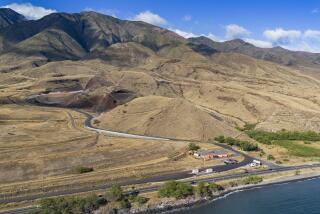Hawaiian Church Loses a Round in Its Battle to Expand
- Share via
A federal judge in Hawaii has refused to order the island of Maui to allow the controversial expansion of a church in a rural agricultural neighborhood--one of a growing number of cases involving the rights of churches confronted with often-prohibitive local land-use restrictions.
In a ruling late Wednesday, U.S. District Judge Samuel P. King in Honolulu said the Hale O Kaula Church first must determine whether Maui County has prohibited the congregation from conducting religious services on the 5.8-acre property, or whether it is simply prohibiting the church from expanding its buildings on the site.
The court left undecided the most important legal issues of the case, involving the applicability of a 2-year-old federal law that prevents government regulators from imposing a “substantial burden” on religious exercise through zoning laws and other land-use restrictions.
The Hale O Kaula case has attracted attention across the country, in part because neighbors’ opposition to the church expansion focused not only on traffic, water and safety issues but on questions about the nature of the church and its members.
The Washington-based Becket Fund for Religious Liberty, which joined the church in seeking the preliminary injunction, argued that the county’s failure to allow the church to expand on its property was an unconstitutional restriction on the congregation’s freedom to worship.
The 60-member Hale O Kaula congregation currently meets at a small building in the town of Haiku, several miles away from the agricultural property. The facility is too small, and church leaders bought the property near Kula several years ago with the hope of building a larger facility and implementing the church’s agricultural ministry.
The church follows the Joseph Ministry, which Pastor David Jenkens said encompasses restoring the Earth “to its natural condition, as close to what God had created as is physically possible.”
“The land itself is an absolutely necessary aspect of our religious expression.... Our ideal is to grow as much of our own food as possible, and prepare and eat many of our meals together,” he said. Church officials argued that such a mission was not inconsistent with the agricultural zoning on the property.
But neighbors objected. The property lies at the end of a short paved road in the Maui hill country, far from most waterlines. Residents and county officials said the church would bring increased traffic and could present a fire safety problem because of the unavailability of water.
In his ruling, King did not address the constitutional issues but said the church and the county first should determine whether the church is permitted to hold worship services in the house and small barn that stand on the property.
If the county denies that, then the court can look at that as well as the expansion issue, the judge said.
Jenkens said the county already has denied the church permission to conduct worship services. “They’ve told us we can’t even occasionally put up a tent and worship on the property,” Jenkens said. “I guess what [the judge] is saying is, we have to ask them again.”
Victoria Takayesu, corporate counsel for Maui County, said the county has never ruled directly on that issue. “They’ve never been told that they can’t pray over their crops, or they can’t have prayer meetings there occasionally,” she said. “They were requesting additional construction, and that kind of thing.”
She said the county likely will ask the judge to issue a summary judgment on the legal issues, a move that could lead to a final decision within a few months.
More to Read
Sign up for Essential California
The most important California stories and recommendations in your inbox every morning.
You may occasionally receive promotional content from the Los Angeles Times.










